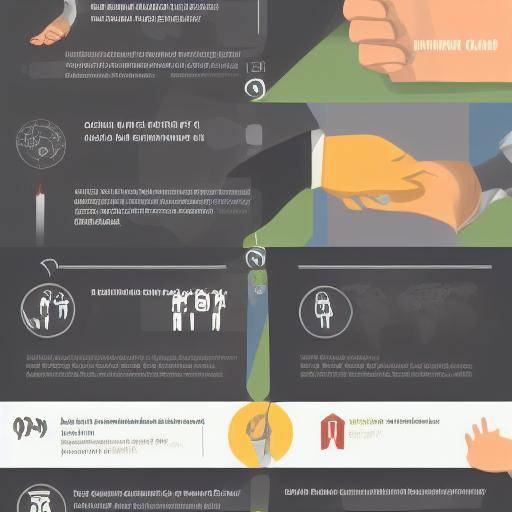
Advertising is omnipresent in our modern society and can influence our purchasing decisions significantly. However, excess advertising can overload people, alter their perception and encourage unwanted consumption habits. In this article, we will explore effective strategies to reduce the impact of advertising on consumption, focusing on control, evaluation and habits. You will discover how to take control of the advertising you find, evaluate it critically and change your consumption habits to make more informed decisions.
Introduction
Advertising is a powerful tool that shapes our preferences, perceptions and purchasing behaviors. From billboards to social media ads, advertising can reach us directly, influencing our purchasing decisions in ways that we don't even perceive. In this sense, it is important to understand how advertising can affect our consumption and, more crucially, how to counteract its influence.
Throughout this article, we will explore specific strategies that will allow you to take control of the advertising that surrounds you, evaluate it critically and adjust your consumption habits to make more conscious and informed decisions.
History and Background
Advertising has existed for centuries, evolving from simple forms of promotion to becoming a multi-million dollar industry with an impact on all spheres of modern life. From printed advertisements to television commercials and online advertising, the evolution of advertising has gone hand in hand with the advance of technology and consumer culture.
Origins and Historical Development
Advertising, in its most basic form, has existed since time immemorial. From public proclamations in ancient Rome to announcements in the nineteenth century newspapers, the promotion of goods and services has been a constant in human history. However, it was during the Industrial Revolution when advertising began to acquire the modern features we know today. Mass production and improved distribution systems allowed companies to reach a wider audience, leading to more elaborate and aggressive advertising campaigns.
Significant Developments and Daughters
The twentieth century marked a turning point in the history of advertising, with the introduction of mass media such as radio and television. These new channels provided advertisers with unprecedented ways of reaching the audience, which led to the creation of global brands and iconic advertising campaigns that persist in collective memory. Subsequently, the arrival of the Internet and social networks again transformed the advertising landscape, giving companies the ability to target consumers more accurately and collect detailed data on their habits and preferences.
Anecdotes and Case Studies
An outstanding example of the evolution of advertising is the fashion industry. In the 19th century, fashion brands began to use advertisements in magazines to promote their products, which led to the creation of a global market of trends and styles. Today, fashion conglomerate marketing campaigns reach a massive audience, directly influencing purchasing decisions and consumption habits of millions of people around the world.
Comprehensive analysis
Advertising has the potential to provide useful information on products and services, but it also poses significant challenges in terms of manipulation, lack of transparency and undesired pressures on consumers. It is crucial to critically analyze the influence of advertising on consumption and understand how we can counteract its negative impact.
Benefits and Challenges of Advertising
The benefits of advertising are undeniable. It provides consumers with information on products and services, promotes competition among companies already injurious to finance the media and promotes economic growth. However, advertising also poses significant challenges, such as the promotion of unreal standards, the exploitation of consumer insecurity and the constant disruption of everyday life.
Current trends and perspectives
In the digital era, advertising has undergone a radical transformation. The personalization of data-based ads, the boom in influencers' marketing and the integration of advertising into entertainment content are just some of the current trends that are shaping the advertising landscape. These trends pose additional challenges in terms of privacy, ethics and advertising saturation, which underlines the importance of critically assessing advertising in the current environment.
Details of Complex Concepts
Consumer psychology and neuroscience have played a crucial role in the design of effective advertising strategies. The analysis of how ads impact the human brain, generate emotions and shape purchasing decisions provides valuable information about the influence of advertising on consumption. Understanding these complex concepts allows us to develop strategies to counter advertising manipulation and make more conscious and informed consumer decisions.
Comparative review
Control, evaluation and consumption habits are key elements to reduce the negative impact of advertising. Understanding how these factors interact and influence each other provides an integral vision of how we can change our relationship with advertising and consumption.
Control vs. Influence of Advertising
Taking control of the advertising around us involves developing skills to filter, discern and manage exposure to advertisements. This may involve from blocking online ads to limiting the time of exposure to television. By taking proactive measures to control our exposure to advertising, we can reduce your influence on our purchasing decisions and consumption habits.
Publicity Critical Assessment
The ability to critically evaluate advertising is essential to counteract its negative impact. This involves questioning advertising claims, identifying emotional manipulation techniques and seeking independent and truthful information about the products or services promoted. By developing critical evaluation skills, we can avoid being influenced by misleading ads and making purchase decisions based on solid and reliable information.
Change of Consumer Habits
Consumer habits are deeply influenced by advertising. By understanding how advertising shapes our habits and preferences, we can adopt a conscious approach to changing our consumption patterns. This can involve looking for ethical and sustainable alternatives to reflective and minimalist consumption. By changing our consumption habits, we can reduce the impact of advertising on our lives and promote more ethical and sustainable consumption.
Practical Tips and Accessible Tips
Here are a series of practical tips to implement the strategies discussed above and reduce the impact of advertising on consumption:
- Use ad blockers and adjust the privacy settings on your devices to limit exposure to online ads.
- Practice critical publicity assessment, questioning exaggerated promises and seeking independent opinions from other consumers.
- Diversify your sources of product and service information, avoiding relying solely on advertising to make purchase decisions.
- It creates a budget and a list of conscious shopping, prioritizing the needs of desires and avoiding impulsive purchases induced by advertising.
- Find alternatives to massively promoted products and brands, exploring ethical, sustainable and local options.
These tips can help you take control of your exposure to advertising, evaluate it critically and change your consumption habits conscientiously, thus promoting more informed and sustainable purchasing decisions.
Industry Perspectives and Expert Reviews
Various experts and industry professionals have informed opinions about how advertising impacts on consumption and what strategies can be implemented to mitigate its influence.
Futures and Predictions
Consumer marketing and psychology experts predict a greater focus on advertising transparency and corporate responsibility. The growing awareness of the impact of advertising on mental health and the environment is leading to a shift towards more ethical and sustainable advertising practices. In addition, there is an increase in the use of artificial intelligence and the customization of advertisements, which poses new challenges in terms of privacy and data manipulation.
Sector Trends and Prognostics
The convergence of digital marketing, data analytics and programmatic advertising is shaping a future where businesses can target consumers more accurately and in real time. This poses challenges for consumers in terms of privacy and manipulation, which underlines the importance of strengthening publicity control and evaluation strategies.
Case Studies and Practical Applications
Through real case studies, we can see how the strategies of control, evaluation and change of consumption habits have positively impacted the relationship between advertising and consumption.
Impact of Control Strategies on Consumer Habits
A case study in the field of digital marketing revealed that the implementation of control tools, such as ad segmentation and the management of privacy preferences, led to a significant decline in purchases influenced by non-ethical advertising. Participants who used these tools reported more reflective consumption habits and a reduction in impulsive purchases.
Critical Assessment and Consumer Empowerment
The analysis of cases of consumers who conducted a critical publicity assessment highlighted an increase in awareness of advertising manipulation strategies and increased consideration of alternative sources of information. These consumers reported a decrease in purchases based on deceptive advertisements and greater satisfaction with purchasing decisions.
Transformation of Habits through Consumer Consciousness
Conscious consumption studies indicated that consumers who implemented changes in their consumption habits, such as reducing the consumption of highly promoted products or seeking sustainable alternatives, experienced greater satisfaction with their purchasing decisions and a reduction in the negative impact of advertising on their lives.
Future Trends and Predictions
The importance of reducing the impact of advertising on consumption will remain a relevant issue in the coming years. It is essential to continue developing effective strategies to take publicity control, evaluate it critically and promote conscious and ethical consumption habits. The convergence of technology, advertising and consumption will require a proactive approach to counteract the negative influence of advertising in our lives.
Conclusions
The influence of advertising on consumption is significant, but not insurmountable. By taking control of the advertising around us, critically evaluating its impact and changing our consumption habits, we can reduce its negative impact and make more informed decisions. It is crucial to continue developing effective strategies and to raise awareness of the power of publicity in our lives.
Frequently asked questions
How can I reduce my exposure to online advertising?
You can reduce your exposure to online advertising using ad blockers, adjusting the privacy settings on your devices and avoiding clicking on unwanted ads.
What strategies can I use to critically evaluate advertising?
You can critically evaluate advertising by questioning exaggerated claims, seeking independent opinions from other consumers, by thoroughly investigating promotional products or services and by avoiding ad-based decisions.
How can I change my consumption habits to reduce the influence of advertising?
You can change your consumption habits by opting for ethical, sustainable and local alternatives, prioritizing desire needs, avoiding impulsive purchases and diversifying your sources of product and service information.
What is the impact of advertising on children's consumption habits?
Advertising can have a significant impact on children's consumption habits, influencing their preferences, desires and behaviors. It is crucial to teach children skills to critically evaluate advertising and foster healthy eating habits from an early age.
What is the role of government regulation in advertising and responsible consumption?
Government regulation plays a crucial role in protecting consumers from deceptive or harmful advertising practices. Advertising-related laws and regulations seek to ensure veracity, transparency and ethics in advertising practices, thereby promoting more responsible consumption.
How can I raise awareness of the impact of publicity on consumption in my community?
You can raise awareness about the impact of publicity on consumption in your community by organizing talks, workshops or awareness campaigns, sharing relevant information on social media and promoting conscious and ethical consumption in your environment.
What is the future of advertising and its impact on consumption?
The future of advertising and its impact on consumption is marked by the evolution of technology, consumer privacy and corporate responsibility. It is expected that there will be a greater focus on ethical and sustainable advertising practices, as well as greater consumer empowerment to make informed and conscious consumer decisions.
Conclusion
In short, control, evaluation and consumption habits play a crucial role in reducing the impact of advertising on consumption. By taking measures to control our exposure to advertising, critically evaluate it and change our consumption habits, we can counteract its negative influence and promote more conscious and ethical consumption. It is essential to continue developing effective strategies and to raise awareness of the power of advertising in our lives to build a more responsible and sustainable future of consumption.






















































